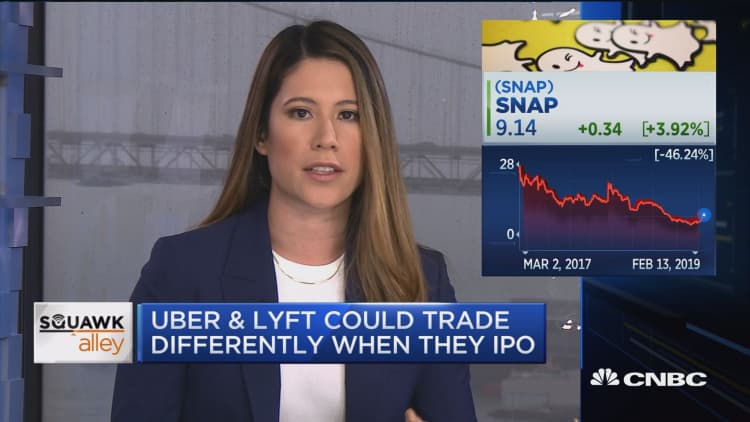In 2018, Dara Khosrowshahi's first full year as Uber's CEO, the company narrowed losses and continued to grow revenue, though at a slower pace than in the previous year.
According to the private company's self-reported financials, full-year revenue for 2018 was $11.3 billion, up 43 percent year over year.
Gross bookings, or the amount collected before payouts to drivers, grew to $50 billion for the year, up 45 percent from the prior year. Its adjusted losses decreased 15 percent in 2018 to $1.8 billion, down from $2.2 billion in 2017. The figure excludes the company's sale of its Russia and Southeast Asia businesses. Including those two sales to Yandex and Grab, respectively, Uber actually saw GAAP losses of $370 million. GAAP losses in 2017 were $4.5 billion.
So while the growth rate is strong by most standards, Uber's growth decelerated over 2018. On a quarterly basis, Uber continues to report heavy losses and slowing growth. Uber's revenue for the fourth quarter came in at $3 billion, up 25 percent from the same quarter last year, lower than the 38 percent it grew in Q3.
While that's not viable for most public companies, Uber is expected to go public this year with a rumored valuation of over $120 billion, and investors will have to decide if Uber's slowing growth warrants that valuation.
In the fourth quarter of 2018, Uber also reported an adjusted loss of $768 million. A $358 million benefit from income taxes cut down what would have been a more than $840 million adjusted loss. Gross bookings for Q4 came in at $14.2 billion, up 37 percent from the same quarter a year prior. It's the highest it has ever been, the company told investors.
In the lead-up to its 2019 IPO, Uber is pitching itself as a full platform for transportation and logistics, not just ride-hailing. The company hopes that moonshot projects such as Uber freight, electronic bikes, autonomous driving and its development of flying cars will help it own a piece of every trip across any vehicle. However, these segments are costly for Uber to develop, weighing on Uber's long-term profitability.
Khosrowshahi took over Uber in November 2017 from founder Travis Kalanick. He inherited a company that was growing quickly but losing billions overseas and roiled by controversy and board infighting. One of his first moves was to retreat from Russia. A few months later, he sold Uber's unprofitable Southeast Asia business.
He has hired a CFO and COO, and so far, appears on track to bring the company public this year.
At the same time, Khosrowshahi has made big expensive bets, such as Uber's acquisition of the bike- and scooter-sharing start-up Jump, and doubling down on expanding Uber Eats.
Uber now considers food delivery part of its core business, along with ride-hailing. While it didn't break out UberEats for the fourth quarter, the segment made up 17 percent of its business in Q3. Back in October, Uber said it was expanding its food-delivery business to cover 70 percent of the U.S. by the end of 2018.
Uber's take rate, or the percentage of revenue Uber makes for every gross booking, declined in Q4. The company told investors that the decline is due to continued investment in new lines of business and rising competition.
Uber may be spending more in the lead-up to its IPO to shore up its market share. Research firm Second Measure shows that Lyft, Uber's largest U.S. competitor, has taken 28.9 percent of the market over the last year. Lyft is also gearing up for an IPO this year, and both companies are racing to get out first. Uber and Lyft filed to go public confidentially on the same day.
Uber's CFO, Nelson Chai, called 2018 the company's strongest year yet.
"Q4 set another record for engagement on our platform," Chai said in a statement. "In 2018, our ride sharing business maintained category leadership in all regions we serve, Uber Freight gained exciting traction in the US, JUMP e-bikes and e-scooters are on the road in over a dozen cities, and we believe Uber Eats became the largest online food delivery business outside of China, based on gross bookings."
Correction: This story was updated to reflect Uber's GAAP losses in 2018 and remove a revenue growth stat for 2017 that was not comparable to 2018.








